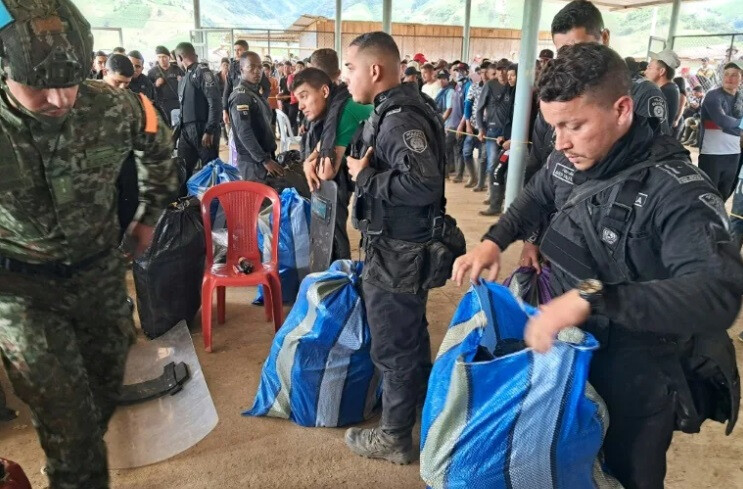
Popayán, Colombia – After a tense standoff lasting several days, 28 Colombian police officers and one soldier, who were held captive by residents in the conflict-ridden Cañón del Micay region, were released on Saturday. The release occurred after a government commission, including representatives from the Ombudsman's Office, intervened.
The security forces were detained in a community meeting center in La Hacienda, a rural area notorious for its heavy concentration of coca crops and its status as a key stronghold for the EMC, a dissident guerrilla group that rejected the 2016 peace agreement with the now-defunct FARC rebels.
The release process involved local residents, some with covered faces, who directed the officers to gather their riot gear before departing. The officers, in a single file, were escorted by the residents along a five-kilometer dirt road towards the neighboring town of El Plateado. Just before reaching El Plateado, they were met by the government commission.
The Cañón del Micay region has been a focal point of conflict due to its strategic importance for drug trafficking. The detention of the security forces followed clashes that erupted during a government operation aimed at curbing the violence associated with the narcotics trade. Reports indicate that during the initial confrontations, a police vehicle was set ablaze, causing injuries to officers.
Major Nilson Bedoya, the soldier among those detained, expressed his relief and thoughts of his family as he walked towards freedom. Officials from the Ombudsman's Office greeted the released officers with embraces, and the convoy proceeded to El Plateado, encountering brief delays due to drone sightings.
Upon arrival in El Plateado, the convoy stopped at a gas station, where United Nations officials and a contingent of soldiers were present.
The Colombian government, led by President Gustavo Petro, has been navigating a complex situation in the region. While pursuing security operations to combat drug trafficking, the government also proposes a comprehensive crop substitution program to provide alternative livelihoods for coca farmers.
However, local residents have expressed concerns about what they perceive as forced eradication of coca crops. Government officials, including Interior Minister Armando Benedetti, have clarified that crop substitution will be voluntary and that misinformation campaigns by drug cartels have contributed to the tensions.
The government maintains that the EMC has manipulated some residents, while community leaders argue that increased militarization will only escalate conflict.
"We are going to continue working for these lands so that the people can have a better future," Major Bedoya told AFP. "The farmers have been sold the idea that we are their enemies, but we are their greatest allies."
The situation highlights the ongoing challenges in Colombia's efforts to establish peace and security in regions affected by drug trafficking and guerrilla activity.
[Copyright (c) Global Economic Times. All Rights Reserved.]






























